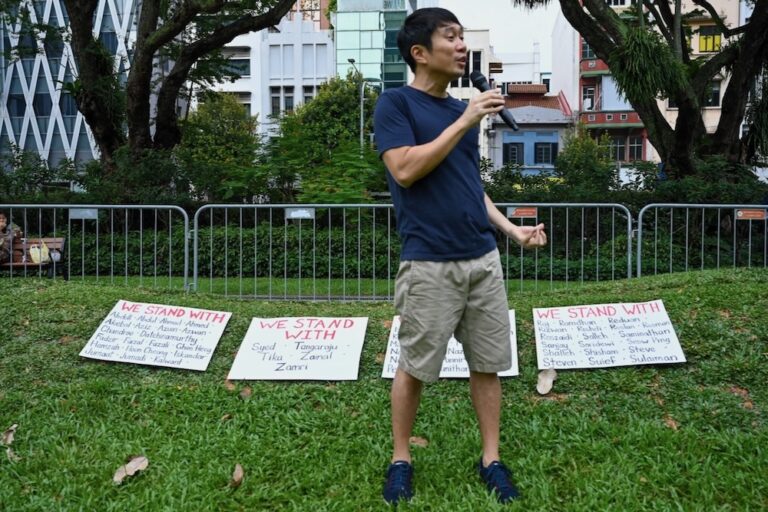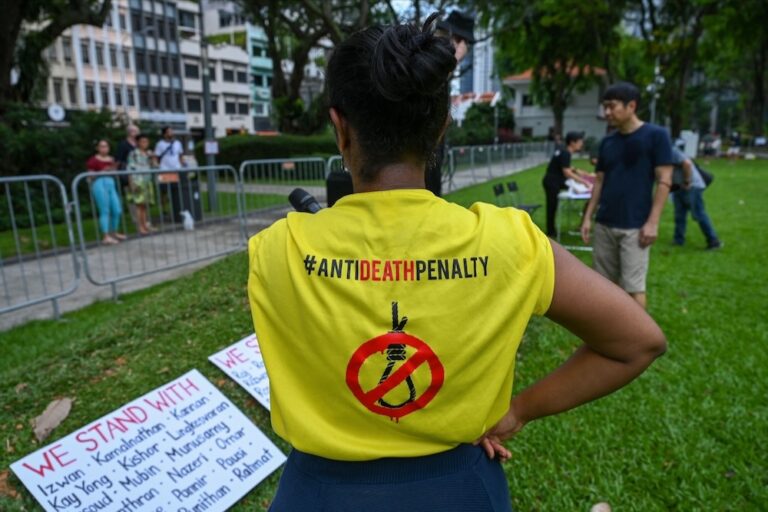(SEAPA/IFEX) – The Southeast Asian Press Alliance (SEAPA) has expressed alarm over the recent ruling by a Singaporean High Court judge to dismiss a lawsuit which charged the country’s public institutions with trampling the rights of their citizens to free assembly and free speech. SEAPA is concerned that “this ruling will have implications for the […]
(SEAPA/IFEX) – The Southeast Asian Press Alliance (SEAPA) has expressed alarm over the recent ruling by a Singaporean High Court judge to dismiss a lawsuit which charged the country’s public institutions with trampling the rights of their citizens to free assembly and free speech.
SEAPA is concerned that “this ruling will have implications for the rights of Singaporean citizens to free assembly and free speech, as the ruling signals that Singaporean citizens cannot express their concerns over the government and its policies even through peaceful protest, though this right is supposedly guaranteed by the Constitution,” SEAPA noted.
According to the opposition Social Democratic Party’s E-newsletter of 21 December, Judge V. K. Rajah said in the ruling, delivered two weeks earlier, that Singaporean citizens cannot stage public protests because these undermine “the singularly stable and upright stature Singapore has managed to uphold.”
In dismissing the case, Judge Rajah described the protest as “incendiary,” and stated that it amounted “to a grave attack on the financial integrity of key public institutions.” The judge further concluded that Singaporean citizens would be held accountable and personally responsible by the state for their actions: “In Singapore, Parliament has, through legislation, placed a premium on public order, accountability and personal responsibility.”
The decision was made after four protesters sued the minister for Home Affairs and the commissioner of police for unlawfully dispersing their peaceful protest in August 2005, held outside a government building in downtown Singapore. The four had argued that they had the right to stage the protest under the Constitution, which allows a group of four people or fewer to assemble in public. But the police sent the anti-riot squad to disperse the four protesters.
According to the SDP newsletter, the peaceful protest, with the words “CPF, NKF, HDB, GIC: Be transparent now!” painted on the four protesters’ t-shirts, urged the government to be transparent and accountable in its handling of public funds in the wake of a scandal that involved the National Kidney Foundation.
The SDP said the foundation was reportedly found to have spent donated money on luxury items like gold taps and expensive cars, and paid the CEO $600,000 (approx. US $400,000) in annual salary. But Mrs. Goh Chok Tong, wife of Singapore’s former prime minister Goh Chok Tong, who was patron of the foundation, said the CEO’s salary was justified as the amount was “peanuts.”
According to SDP, the judge’s decision confirms that the judiciary has no interest in protecting the democratic rights of the people, who are now at the complete mercy of the dictatorial Singaporean government.
SEAPA stated its belief “that to legitimise Singapore’s claim to be a country of world-class public governance, the government and the judiciary should first protect the right of citizens to address their concerns about public institutions, and that these authorities should not regard peaceful protest as a public nuisance.”
“The rights of the citizens to address their concerns over the government policies through public protest is to be upheld as a freedom enjoyed by civilised and open communities all over the world,” SEAPA said.


